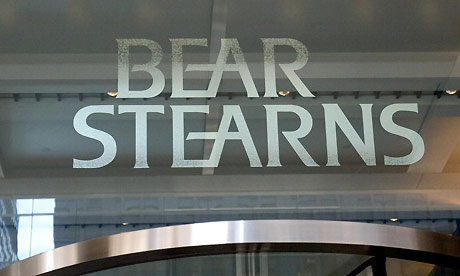Bear Stearns Posts Much Bigger-Than-Expected 4 Q Loss
 New York – Bear Stearns Co Inc, the Wall Street brokerage, on Thursday posted its first quarterly loss in its history. The brokerage firm posted a much bigger-than-expected quarterly loss, slipping $854m (£429m) into the red after falling foul of America's sub-prime mortgage crisis.
New York – Bear Stearns Co Inc, the Wall Street brokerage, on Thursday posted its first quarterly loss in its history. The brokerage firm posted a much bigger-than-expected quarterly loss, slipping $854m (£429m) into the red after falling foul of America's sub-prime mortgage crisis.
After the first loss in the history of the company, it has been decided that top executives would not receive bonuses. According to the Bank of America analyst Michael Hecht, Bear's smaller bonus pool could lead to attrition and hinder a strong rebound.
Bear Stearns reported that it took a $1.9 billion write-down in the fourth quarter ended November 30, reflecting the reduced value of subprime mortgage-related securities. That was bigger than the $1.2 billion the company estimated in early November. The quarterly net loss of $854 million, or $6.90 a share, compared with a year-earlier profit of $563 million, or $4 a share. The loss was nearly four times bigger than the $1.80 a share that analysts were expecting, according to Reuters Estimates.
According to Goldman Sachs analyst William Tanona , the good news was that Bear's subprime mortgages problems might be largely over, but there is doubt that the company is diversified enough to recover as quickly as rivals.
Bear Stearns' shares were down for much of the session, but rallied late in the day as the broader market rose, closing up 82 cents at $91.42 on the New York Stock Exchange. The stock has fallen nearly 44 percent this year, compared with a 16 percent decline for the Amex Securities Broker Dealer index
The majority of Bear Stearns' quarterly loss came from its position in collateralized debt obligations, which are underpinned by risky subprime mortgages. The company said it had unwound, or eliminated, those positions, but overall exposure to subprime mortgages was about $500 million at the end of November.
Sam Molinaro, the Chief Financial Officer described the results as "extremely disappointing." However, he told analysts and investors that senior management's relationship with Bear's board was "very solid and very good."
Lehman Brothers analyst Roger Freeman expressed concern in a research note that Bear's equity revenue was weak, in contrast to rivals, slipping 11 percent to $384 million.
The collapse of two Bear-run hedge funds last summer sidetracked the company's prime brokerage business, which caters to hedge funds. That may have resulted in market share losses to Goldman Sachs Group Inc (GS.N: Quote, Profile, Research), for example, Freeman said.
But Molinaro told in an interview that Bear's prime brokerage business remained "strong and vibrant" and that clients were not terminating their relationship with the company. According to him, some of the decline in account balances is the result of customers dialing back their leverage in shaky credit markets.
Moody's Investors Service cut Bear Stearns' long-term credit rating one notch to "A2," the sixth-highest level, citing the investment banks' weak operational performance in 2007, a more challenging outlook for 2008 and the rating agency's view that Bear's appetite has increased.
Last year, Bear's top four executives received cash and restricted stock then valued at about $103 million. Chairman and Chief Executive Jimmy Cayne's total pay package was nearly $34 million.
Jimmy Cayne has been the subject of unflattering articles about his time playing golf and bridge while the company's key fixed-income business stumbled amid the industry's subprime mortgage woes. He fired co-president Warren Spector and has shown no signal of relinquishing CEO duties to current President Alan Schwartz, as some outsiders have speculated.
Cayne expressed dissatisfaction with the figures: "We are obviously upset with our 2007 results, particularly in light of the fact that weakness in fixed income more than offset strong and, in some areas, record-setting performances in other businesses."
In June, two hedge funds operated by Bear Stearns slipped to the brink of collapse because of their exposure to sub-prime mortgages. Their failure was one of the first clear signs of the havoc to be suffered by financial institutions as a result of delinquent home loans. Barclays, which leant $400m to one of the funds, this week sued Bear Stearns for fraud and deception.
The severity of Bear Stearns' 4 Q loss dismayed analysts. It amounted to $6.91 per share, almost four times a consensus forecast of $1.82 a share.
Tom Jalics, an analyst at National City Bank in Cleveland, told Bloomberg News: "Their problem is they're not as diversified. They don't have a big overseas presence, big investment banking or equities presence. They're kind of a bond shop."
Bear Stearns has cut more than 1,500 jobs this year and its chief operating officer, Warren Spector, was ousted over the summer.
During early trading in New York, the firm's shares rose 1.8% to $92.23. The share price has halved in six months.